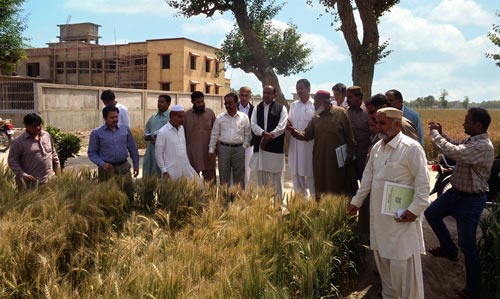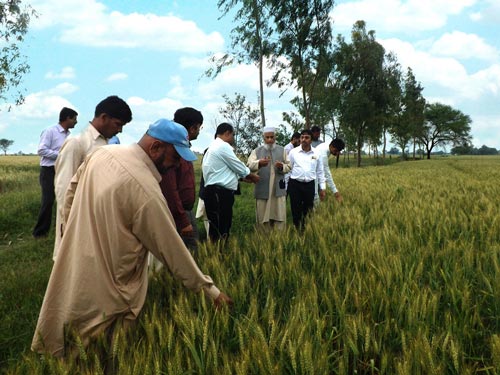
To strengthen functional linkages between private seed companies and public sector institutions in Pakistan, CIMMYT and its national partners jointly organized four training sessions, one each in Punjab and Sindh and two in Khyber Pakhtunkhaw during March and April, 2015. Participants included 45 staff members from 10 private seed companies from those provinces.
Although private seed companies have a major share of Pakistan’s wheat seed market, they rely almost completely on public sector wheat breeding institutes for pre-basic and basic seeds. However, the public sector has limited capacity for producing adequate amounts of pre-basic and basic seed to support the deployment of new wheat varieties. In addition, a recent study on the private wheat seed sector in Pakistan suggests that around two-thirds of seed companies do not obtain the amounts of pre-basic/basic seed they require from public seed corporations.
Currently, only a few private seed companies obtain pre-basic or basic seeds from wheat research institutes based on personal relationships, but functional and institutional linkages between public and private sector organizations have yet to be established. CIMMYT identified this gap and is now working towards bridging it by engaging important actors from both sectors. The first step was to convince the public sector to provide pre-basic and basic seeds to private seed companies, particularly small companies in rural areas. Several of the public sector wheat breeding institutes responded positively to this call. Another important step is to develop the capacity of private seed companies to produce quality basic and certified seed by building trust between them and public sector institutions.

with breeders and seed quality inspectors in Mureedke, Punjab, Pakistan. Photo: Tando Jam/ARI
The training sessions had an innovative curriculum focusing on the technical aspects of producing high quality basic seed and enhancing marketing skills and networking to develop profitable, sustainable seed companies able to produce seed of new varieties. Experts from public sector research institutions addressed subjects such as rouging, isolation distances, crop and varietal mixtures, weed management, post-harvest technologies, quality control procedures, and conservation agriculture. They also showed how contract growers and seed companies can reduce their production costs and improve their profit margins.
Representatives of the Federal Seed Certification and Registration Department (FSC&RD) highlighted protocols for pre-basic/basic and certified seed production and multiplication. The training sessions enhanced participants’ understanding of various aspects of the seed business, such as business plan development, market assessment, product pricing and using proper marketing channels.
The expectation is that 14 private seed companies will produce around 1,000 tons of basic seed of 12 wheat varieties, enough to plant more than 8,000 ha of seed plots. This would enable the production of more than 24,000 tons of certified seed for the rural areas of the three provinces, thus paving the way for decentralized production and marketing of basic wheat seed in Pakistan.
 Capacity development
Capacity development 
